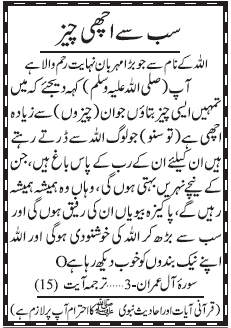Hazrat Khawaja Siraj Uddin Chishti (ra)
Jealousy-ridden people do not find this path For them, then, striving is useless. Express it firmly and harbour no ill-feeling ! Salutations to you, render assistance to me Oh Siraj Uddin, the beloved of the Independent One.
After tumultuous conflicts between the Chishtiyaah and the Tughulaq state, the banner of the Chishtiyyah was handed to the son of Hazrat Kamal Uddin Allama (r.a), Khwaja Siraj Uddin Chishti (r.a). Though little is known about his early life, SirajUddin seems to have been born wali. Much of his childhood and young adulthood was spent in seclusion, meditation and spiritual strivings (mujahadah). The author of Majalis-e-Hasiniyya states that Khwaja Nasir Uddin Chiragh awarded SirajUddin his khilafat when he was only four years old.
Thereafter he continued his pursuit of Islamic Sciences under his learned father, as well as some of the great ulema of Dehli such as Moulana Alim Panipati and Moulana Sangaresa. He soon became known as 'alim al dhr' ( the scholar of the continent), and his abstinence and piety were unmatched.
When Khwaja Kalam Uddin was about to pass away, he called him into his cell and transferred his spirituality to him ( through tawajjuh). The impact of this was so great that whoever looked at him thereafter was transformed into a righteous person. Nevertheless, Khwaja Siraj Uddin went to extraordinary lengths to hide his spiritual state, miracles, and unveilings.
In Maqqam-e-Ganj-e-Shakar it is mentioned that once Makhdum Jahaniyya went to Dehli to attend a gathering of ulema, only to find the young Khwaja Siraj Uddin answering extremely difficult questions with ease. When Makhdum Jahaniya (r.a) learnt that the young man was the son of his own teacher Hazrat Kamal Uddin, he approached him and sought forgiveness for daring to discuss with him. From such a man, he said, one should simply accept and not question. He told Hazrat Siraj Uddin that he was one of his father;s pupils, and that his khilafat had been awarded by his father. At this, Khwaja Siraj Uddin wept, apologizing in turn to Makhdum Jahaniyya for any offence that he might have caused."How great was the company of Khwaja Kamal Uddin and Khwaja Nasir Uddin !" he sighed.
Following the wisal of his father and Khwaja Nasir Uddin, he became the head of the Chishtiyya sisilah. With the conflict between the Chishti order and the ruling powers ended, and the Sufi's increasing popularity with the state, he realized that there were only two options: to remain steadfast to the principles of the order and fade into the background, or to compomise and become co-opted. He chose the former.
There he continued the work of his father, ministering to the physical and spiritual needs of the community there. For over sixty years he headed the order, largely undisturbed by local and international politics. The ruler of Dehli, Sultan Firuz Shah, oce requested him to travel to the Deccan to spread Islam there. He also sent him the sum of 7000 rupees, which at that time was an enormous amount of money, as an inducement. However, acting on the principles of the Chishtiyya, he refused both the invitation and the gift. After a lifetime spent teaching, ministering to the needy, and in the worship of Allah, he made wisal on the 21st jamadi Al Awal 817 AH. His mazar is in Peeran Pattan Gujrat,India and was later incorporated into the castle of Nahrwala.





 This is a free homepage created with page4. Get your own on www.page4.com
This is a free homepage created with page4. Get your own on www.page4.com